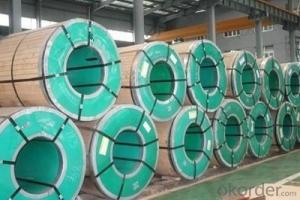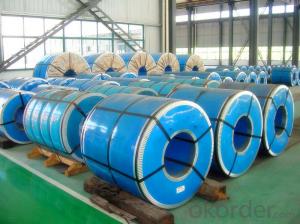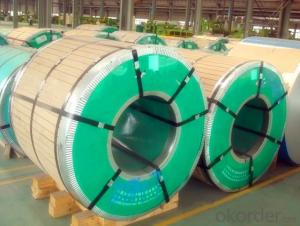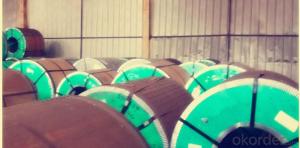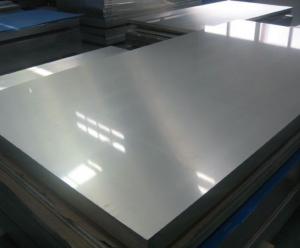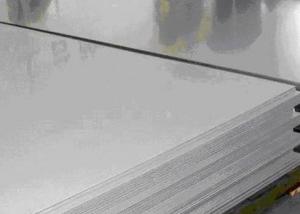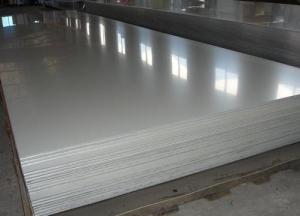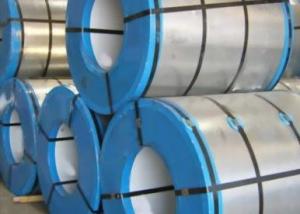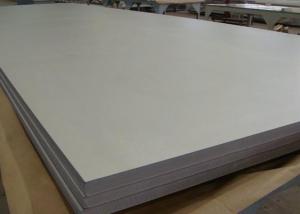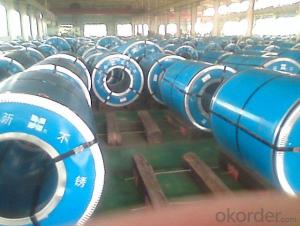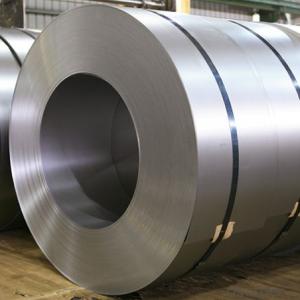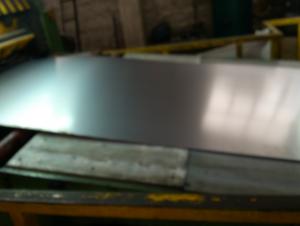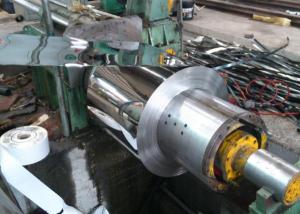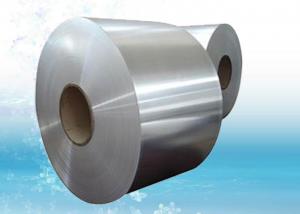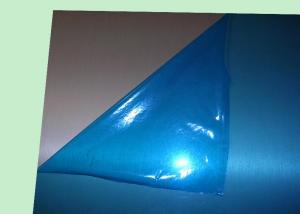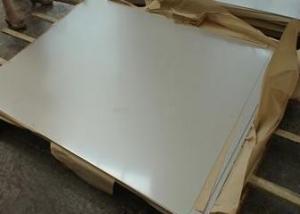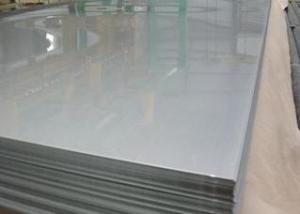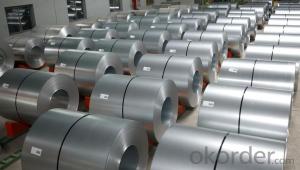Stainless Steel Coil 304 Hot/Cold Rolled 2B/BA/NO.1
- Loading Port:
- Guangzhou
- Payment Terms:
- TT OR LC
- Min Order Qty:
- 100 m.t.
- Supply Capability:
- 20000 m.t./month
OKorder Service Pledge
OKorder Financial Service
You Might Also Like
Hot Rolled Stainless Steel Coil 304
Annealing and Pickling No.1 Finish
Stainless steel is a production which not easy rust,acid resistance and corrosion resistance,so it is widely
used in light industry,heavy industry,daily necessities and the decoration industry.
Hot Rolled Stainless Steel Coil 304 Specifications
1.surface:NO.1
2.standard:JIS, AISI, GB
3.width: 0.55m, 0.65m, 1.0m, 1.22m, 1.5m, 2m or requirement
Hot Rolled Stainless Steel Coil 304 Chemical Composition:
(%):C=0.07, Mn=2.00, P=0.045, S=0.030, Si=0.075, Cr=17.5-19.5, Ni=8.0-10.5, N=0.10
Hot Rolled Stainless Steel Coil 304 Physical Properties
Tensile strength σb (MPa) ≥ 520
the conditions yield strength σ0.2 (MPa) ≥ 205,
elongation δ5 (%) ≥ 40
Reduction of ψ (%) ≥ 50,
hardness: ≤ 187
HB; ≤ 90
HRB; ≤ 200H
- Q:Can stainless steel strips be used in the petrochemical industry?
- Yes, stainless steel strips can be used in the petrochemical industry. Stainless steel is known for its excellent corrosion resistance, making it suitable for various applications in this industry. Petrochemical processes involve the handling of various chemicals, gases, and liquids, many of which can be corrosive. Stainless steel strips are often used in the construction of storage tanks, pipelines, heat exchangers, and other equipment where corrosion resistance is essential. Additionally, stainless steel's high strength and durability make it a reliable choice for petrochemical applications, as it can withstand high temperatures and pressures. Overall, stainless steel strips are a preferred material in the petrochemical industry due to their corrosion resistance, strength, and longevity.
- Q:Can stainless steel strips be used in packaging machinery?
- Yes, stainless steel strips can be used in packaging machinery. Stainless steel is a versatile and durable material that is commonly used in machinery and equipment, including packaging machinery. It offers excellent resistance to corrosion, high temperature, and wear, making it suitable for various packaging applications. Stainless steel strips can be used in packaging machinery for tasks such as cutting, sealing, and forming packaging materials. Additionally, stainless steel's smooth surface and easy-to-clean properties make it an ideal choice for maintaining hygiene and preventing contamination in the packaging process. Overall, stainless steel strips are a reliable and efficient option for use in packaging machinery.
- Q:Can stainless steel strips be used in automotive industries?
- Stainless steel strips have the ability to be utilized within the automotive sector. The properties of stainless steel, including its impressive resistance to corrosion, high strength, and durability, establish it as an appropriate material for a variety of applications in the automotive industry. Automotive components, such as exhaust systems, trim, body panels, brackets, and reinforcements, are frequently manufactured using stainless steel strips. These strips possess the capability to withstand the harsh conditions commonly found in automotive environments due to their resistance to heat, chemicals, and wear. In addition, the ease with which stainless steel strips can be shaped, welded, and fabricated allows for flexibility in design and efficient production. As a result, stainless steel strips have become a dependable and widely preferred choice in the automotive industry.
- Q:Can stainless steel strips be used in the production of medical instruments for sterilization?
- Yes, stainless steel strips can be used in the production of medical instruments for sterilization. Stainless steel is a common material choice in the medical industry due to its excellent corrosion resistance, durability, and ability to withstand high temperatures. It can be effectively sterilized using various methods such as autoclaving, making it suitable for use in medical instrument production.
- Q:What are the advantages of using stainless steel strips in the automotive industry?
- Using stainless steel strips in the automotive industry comes with several advantages. Firstly, stainless steel is renowned for its strength and durability. It boasts exceptional resistance to corrosion, heat, and wear, making it suitable for various automotive applications. Stainless steel strips can endure harsh environments, including extreme temperatures and exposure to chemicals, without compromising their structural integrity. This longevity ensures that automotive components made from stainless steel strips have an extended lifespan, reducing the need for frequent replacements and increasing overall efficiency. Secondly, stainless steel strips possess a high aesthetic appeal. Their sleek and shiny appearance can enhance the overall visual appeal of automotive parts, which is particularly crucial in the automotive industry where aesthetics play a significant role in attracting customers. Furthermore, stainless steel strips are highly malleable and can be easily molded into different sizes and dimensions. This flexibility enables manufacturers to create intricate and tailor-made automotive components that meet the specific requirements of various vehicle models. Additionally, stainless steel strips can be seamlessly welded, allowing for effortless integration into automotive structures. Another advantage of stainless steel strips is their exceptional resistance to impact and vibration. This makes them ideal for use in the automotive industry where components are constantly subjected to stress and movement. Stainless steel strips can effectively absorb shocks and vibrations, reducing the risk of damage to critical automotive parts and ensuring the safety of drivers and passengers. Moreover, stainless steel is a sustainable and environmentally friendly material. It is 100% recyclable, making it a responsible choice for the automotive industry. By utilizing stainless steel strips, manufacturers can contribute to waste reduction and the conservation of natural resources. In conclusion, the benefits of using stainless steel strips in the automotive industry are numerous. From its strength and durability to its aesthetic appeal and formability, stainless steel offers a range of advantages that enhance the performance and efficiency of automotive components. Its resistance to corrosion, impact, and vibration, coupled with its sustainability, make it a reliable and eco-friendly choice for the automotive industry.
- Q:Can stainless steel strips be used for knife blades?
- Knife blades can indeed be made using stainless steel strips. The reason why stainless steel is a favored option for knife blades is because it is resistant to corrosion, durable, and easy to maintain. Utilizing stainless steel strips offers a flexible and budget-friendly alternative for producing knife blades. Nevertheless, it is crucial to consider that the kind of stainless steel employed and the heat treatment procedure greatly impact the blade's performance. Generally, knife blades tend to favor stainless steel strips of superior quality that possess the necessary hardness and edge retention properties.
- Q:What are the advantages of using precision rolled 111 stainless steel strips?
- Precision rolled 111 stainless steel strips offer several advantages. Firstly, their precise dimensions ensure uniformity and accuracy in various applications, resulting in improved product quality and performance. Secondly, the superior surface finish of these strips enhances their corrosion resistance, making them highly durable and long-lasting. Additionally, precision rolling eliminates the need for further processing, saving time and reducing costs. Lastly, their excellent mechanical properties, including high strength and toughness, make them suitable for demanding environments and applications.
- Q:What is the tensile strength of stainless steel strips?
- The tensile strength of stainless steel strips can vary depending on their specific grade and thickness. However, stainless steel stands out for its superior tensile strength compared to other materials. On average, stainless steel strips exhibit a tensile strength range between 515 and 2,000 megapascals (MPa). It is worth noting that the manufacturing process and any additional treatments applied to the stainless steel can also impact its tensile strength. As a result, it is always recommended to consult the technical data sheet or seek guidance from a supplier for precise and comprehensive information regarding the tensile strength of a specific stainless steel strip.
- Q:Can stainless steel strips be used in the production of automotive body panels?
- Yes, stainless steel strips can be used in the production of automotive body panels. Stainless steel is known for its durability, corrosion resistance, and aesthetic appeal, making it a suitable material for automotive applications. It provides strength and protection against rust, making it a popular choice for body panels that need to withstand harsh weather conditions and potential impacts.
- Q:How do you clean stainless steel strips?
- To clean stainless steel strips, you can start by wiping them down with a soft cloth or sponge soaked in warm soapy water. For tougher stains or dirt buildup, you can use a non-abrasive cleaner specifically formulated for stainless steel. It's important to avoid using abrasive materials or harsh chemicals as they can damage the surface. After cleaning, make sure to rinse the strips thoroughly with water and dry them with a clean cloth to prevent water spots or streaks.
1. Manufacturer Overview |
|
|---|---|
| Location | |
| Year Established | |
| Annual Output Value | |
| Main Markets | |
| Company Certifications | |
2. Manufacturer Certificates |
|
|---|---|
| a) Certification Name | |
| Range | |
| Reference | |
| Validity Period | |
3. Manufacturer Capability |
|
|---|---|
| a)Trade Capacity | |
| Nearest Port | |
| Export Percentage | |
| No.of Employees in Trade Department | |
| Language Spoken: | |
| b)Factory Information | |
| Factory Size: | |
| No. of Production Lines | |
| Contract Manufacturing | |
| Product Price Range | |
Send your message to us
Stainless Steel Coil 304 Hot/Cold Rolled 2B/BA/NO.1
- Loading Port:
- Guangzhou
- Payment Terms:
- TT OR LC
- Min Order Qty:
- 100 m.t.
- Supply Capability:
- 20000 m.t./month
OKorder Service Pledge
OKorder Financial Service
Similar products
New products
Hot products
Hot Searches
Related keywords
